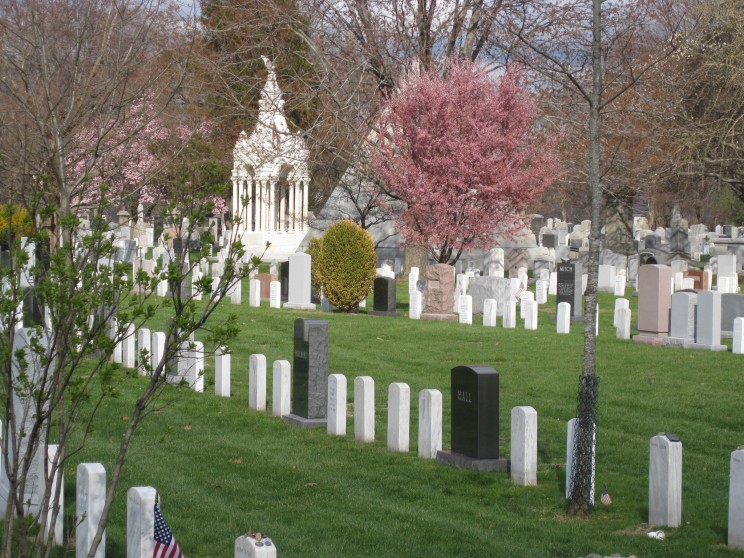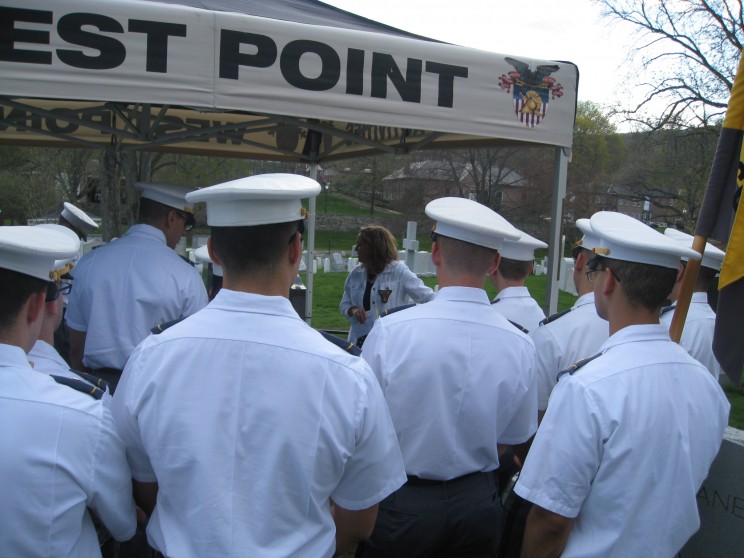I have ambivalent feelings about Easter. I am sure I am not alone in this attitude towards the greatest of events on the Christian calendar, especially among people who grew up, as I did, in intensely religious (and loving) families but who have long put their Christian beliefs behind them. As it happens, my family were Quakers and that religion does not mark out the church festivals. But I went to a school that had a great musical tradition and each year there was a performance of one of the Bach Passions, alternating the St Matthew with the St John.
The post Easter for a non-believer appeared first on OUPblog.
By Michael D. Matthews
My daily walk to work takes me through West Point’s cemetery. Founded in 1817, the cemetery includes the graves of soldiers who fought in the American Revolution, and in all of the wars our country has fought since. I often stop and reflect on the lives of these men and women who are interred here. Many headstones are of West Point graduates who were killed in World War II, including several on D-Day. Others fell in the Civil War, the Spanish-American War, World War I, and Korea and Vietnam. One section holds special significance for me, since it contains the graves of former cadets and colleagues I have known in the past 14 years who died in Iraq or Afghanistan. No matter how preoccupied I may be with the vagaries of day to day life, a sense of peace and calm envelopes me as I stroll among the headstones. I feel I am among friends and comrades and there is a sense of connectedness with the past.

One of the soldiers interred at West Point is Lieutenant Christopher Kurkowsi. Chris graduated from West Point in 1986 with a degree in Engineering Psychology. He became an artillery officer and was killed on 26 February 1988 when the helicopter he was in crashed while on a routine training mission. At the time of the accident, Chris’s academic mentor at West Point, Lieutenant Colonel Timothy O’Neil, had initiated paperwork to send Chris to graduate school in psychology with a follow-on assignment to his old department at West Point. According to Lieutenant Colonel O’Neil, Chris would have made a tremendous psychologist and professor. Chris’s death exemplifies the loss of talent and potential of all of the soldiers buried at West Point.
Earlier this month, West Point held its annual “Inspiration to Serve” cemetery tour. All members of the West Point Class of 2016, who are finishing their second of four years of academic study and military training at West Point, participated. On this day, classmates, family, or friends of the fallen stand by a gravesite, and tell the story of the deceased to the cadet attendees. Of special interest this year, MaryEllen Picciuto, one of Chris Kurkowski’s classmates, told his story of service and sacrifice. The cadets stood respectfully and listened intently, as Ms. Picciuto brought Chris back to life through her remembrances. As she did this, other cadets stood by other graves, hearing the life story of other West Point graduates who gave their lives in the service of our country.

As a Nation, our move to an all volunteer force has distanced most Americans from direct experience and knowledge of the military and the men and women who serve. Cognitive psychologists make a distinction between semantic and episodic memory. The former is memory of generalized facts that are not part of our own personal experience. The latter, in contrast, are of events personally experienced. Think about your own memories. Those that are episodic are likely more vivid and tangible, and perhaps have more meaning in your own life story. You “know” from semantic memories, but you can “feel” in episodic memories.
Perhaps this Memorial Day, in between picnics and family activities, you can visit a veterans cemetery. Walk among the headstones, read the inscriptions, and reflect on what these men and women sacrificed for our Nation. Like Lieutenant Kurkowski, they had dreams, ambitions, life goals, and family and friends who loved them. Through such a visit, perhaps you can form an episodic memory by honoring the fallen for their service, and in doing so forge a more personal connection with these American heroes.
Note: The views expressed herein are those of the author and do not reflect the position of the United States Military Academy, the Department of the Army, or the Department of Defense.
Michael D. Matthews is Professor of Engineering Psychology at the United States Military Academy. Collectively, his research interests center on soldier performance in combat and other dangerous contexts. He has authored over 200 scientific papers and is the co-editor of the Oxford Handbook of Military Psychology (Oxford University Press, 2012). Dr. Matthews’ most recent book is Head Strong: How Psychology is Revolutionizing War (Oxford University Press, 2014).
Subscribe to the OUPblog via email or RSS.
Subscribe to only brain sciences articles on the OUPblog via email or RSS.
Photos courtesy of Michael D. Matthews. Used with permission.
The post Psychology, veterans, war, and remembrance appeared first on OUPblog.

4.5 Stars Back Cover: Being mean ain’t in nobody’s blood. Reckon folks will argue that one until there’s no more moonshine on the mountains. But in Freedom Pen that’s what Sarah the Twerp believes. And soon she and her brother, Billy, are setting out on a courageous summertime adventure to free two pit bull pups [...]
In the ‘I don’t know why I didn’t think of this myself’ department comes a tip from the Bytown Bookshop Blog in Ottawa.
Why not visit your local Thrift Shop the day after a 50% off sale. They tend to sell a pile of books during these sales, most likely some of them to you. Most thrift shops keep stacks of books in the back room. Now with the extra shelf space opened up many of these books will be brought out for the first time. A prime time for picking up little gems. I’ll give this a whirl and report back later
From Bytown Bookshop: Case in point, when I hit the SA last Wednesday after the recent 50% sale there was a shelfload of vintage novels from the turn of the century. Most of it was dreck, however there was one little gem that I snapped up as soon as I laid eyes on it. A first Canadian edition of Sir Arthur Conan Doyle’s The Last Bow.
Bullet Tips,
Thrift ShopShare This




